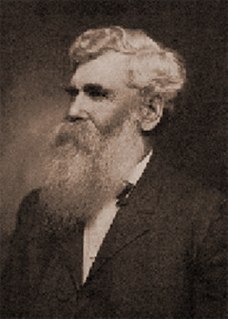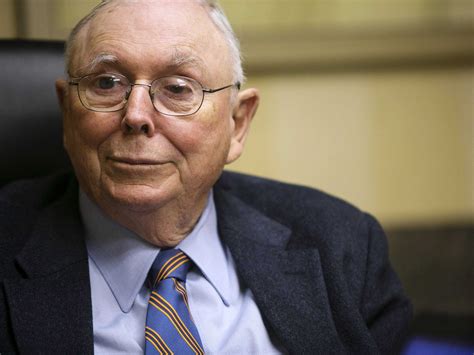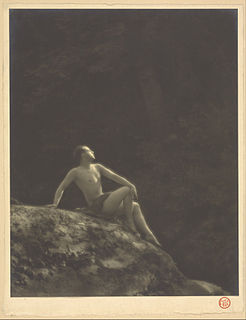A Quote by Jenkin Lloyd Jones
The cathedral, at its noblest, is the best outward symbol of the spiritual nature of man, as it is also the most suggestive measure and prophecy of the corporate life of man.
Related Quotes
The highest spiritual quality, the noblest property of mind a man can have, is this of loyalty ... a man with no loyalty in him, with no sense of love or reverence or devotion due to something outside and above his poor daily life, with its pains and pleasures, profits and losses, is as evil a case as man can be.
Color, in the outward world, answers to feeling in man; shape, to thought; motion, to will. The dawn of day is the nearest outward likeness of an act of creation; and it is, therefore, also the closest type in nature for that in us which most approaches to creation--the realization of an idea by an act of the will.
Insofar as he makes use of his healthy senses, man himself is the best and most exact scientific instrument possible. The greatest misfortune of modern physics is that its experiments have been set apart from man, as it were, physics refuses to recognize nature in anything not shown by artificial instruments, and even uses this as a measure of its accomplishments.
Nature is man's inorganic body -- that is to say, nature insofar as it is not the human body. Man lives from nature -- i.e., nature is his body -- and he must maintain a continuing dialogue with it is he is not to die. To say that man's physical and mental life is linked to nature simply means that nature is linked to itself, for man is a part of nature.
There are three kinds of nature in man, as Nicetas Stethatos further explains: the carnal man, who wants to live for his own pleasure, even if it harms others; the natural man, who wants to please both himself and others; and the spiritual man, who wants to please only God, even if it harms himself. The first is lower than human nature, the second is normal, the third is above nature; it is life in Christ.
Armstrong, sitting in the commander's seat, spacesuit on, helmet on, plugged into electrical and environmental umbilical's, is a man who is not only a machine himself in the links of these networks, but is also a man sitting in (what Collins is later to call) a 'mini-cathedral.' a man somewhat more than a pilot, somewhat more than a superpilot, is in fact a veritable high priest of the forces of society and scientific history concentrated in that mini cathedral, a general of the church of the forces of technology.
Man wants to see nature and evolution as separate from human activities. There is a natural world, and there is man. But man also belongs to the natural world. If he is a ferocious predator, that too is part of evolution. If cod and haddock and other species cannot survive because man kills them, something more adaptable will take their place. Nature, the ultimate pragmatist, doggedly searches for something that works. But as the cockroach demonstrates, what works best in nature does not always appeal to us.
Propaganda must not concern itself with what is best in man - the highest goals humanity sets for itself, its noblest and most precious feelings. Propaganda does not aim to elevate man, but to make him serve. It must therefore utilize the most common feelings, the most widespread ideas, the crudest patterns, and in so doing place itself on a very low level with regard to what it wants man to do and to what end. Hate, hunger, and pride make better levers of propaganda than do love or impartiality.
Outward, thanks to the knowledge of physical laws, man could subdue (or subjugate...) nature, but inwardly, he remained a slave to it. For, when all is said and done, at what is aiming all this display (or deployment) of activity, if not to realized outward profits, to provide material pleasure (or enjoyment). It is not the first time that men sell their birth right for a dish of lentils, and thus disown (or repudiate or deny) the best of thmeselves.
I believe that dance is the oldest, noblest and most cogent of the arts. I believe that dance is the most perfect symbol of the activity of God and His angels. I believe that dance has the power to heal, mentally and physically. I believe that true education in the art of dance is education of the whole man.





































